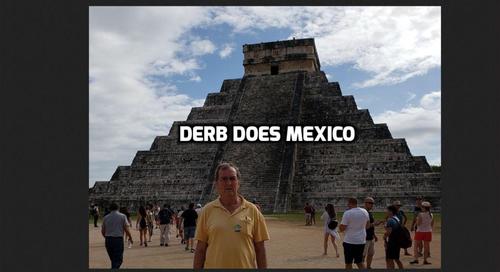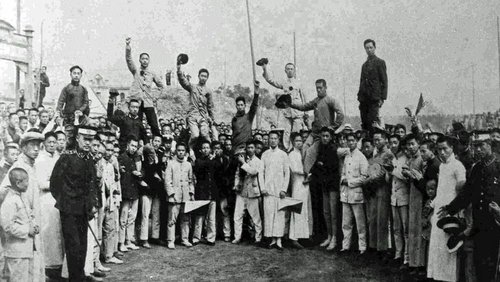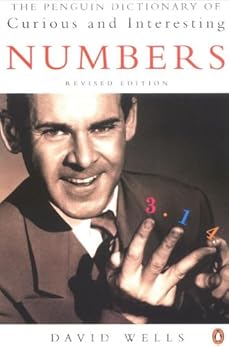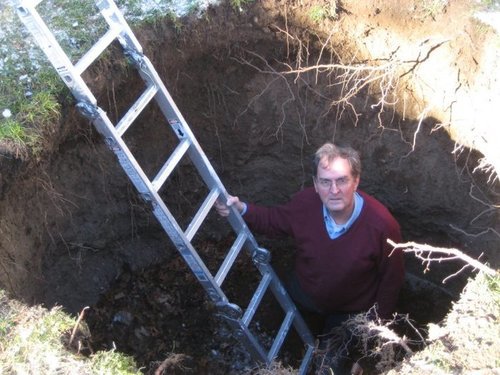
DERB’S DECEMBER DIARY: Mexico Leads The Way; Totalitarian Dilemmas; Did I Cause Popocatépetl To Erupt? [14 ITEMS]
01/01/2019
Mexico leads the way! AI you can love. As mentioned in Radio Derb, the Mrs. and I took a break in Cancún, Mexico the first week of December.

We had a thoroughly enjoyable time; nothing much out of the ordinary, just five days in a very nice hotel (this one) lounging on the beach and poolside, with side trips to Mayan ruins and an adventure park.
A striking thing about the hotel was that it was All Inclusive. That is to say, once you had booked in and paid for your room there were no fees for food and drink. You just helped yourself.
I had trouble believing this at first. Our room, for example, had the usual refrigerator stocked with bottled water and beer. On the wall above the refrigerator was a rack of what in Britain, where I was once a bartender, are called "optics" — upside-down bottles of liquor with a one-measure dispensing spigot. (I've never tended bar in the U.S.A. so I don’t know what they are called here.)
This seemed too good to be true, so I went down to the service desk to check. "Sure," they said, "just help yourself!"
You'd think these All Inclusive places would be heaven on earth for alcoholics, and expect to find them full of staggering drunks. Not at all; the hotel guests were all pleasant, well-behaved middle-class Mexicans and Americans like ourselves — adults only, no guests under 18 — with only a mildly rowdy party-and-dance scene around one of the pools in the late hours.
It’s an interesting business model. I'd like to know how they worked out the math — I mean, of scaling up room charges to cover unlimited food and drink. It wasn’t at all expensive, a mere tick or two above what motels cost in New York.
I’m told there are All Inclusive hotels in the U.S.A., but not many. Mexico leads the way!
Mexico, China; the "front" and the "back." Interesting to be in Mexico. Everyone we dealt with was friendly and helpful, and the organization of the tours was wonderfully efficient, mainly thanks to the advent of the smartphone. The hotel was well-run and spotlessly clean.
So much for mid-20th-century stereotypes. Nowadays there’s chilled beer in England, deodorants in France, litter in Germany, capitalism in Russia, and efficiency in Mexico.
For sure nobody we met was hungry. The WHO ranks Mexico as 17th fattest among the nations of the world by body mass index, a tad slimmer than the U.S.A. at number 12, but perhaps they didn’t include employees of the tourist industry. All the men we dealt with were seriously overweight.
I have no illusions that the Cancún hotel strip is representative of the nation. On the 120-mile drive from Cancún to Chichén Itzá we passed through villages that were seriously Third World — collections of broken-down shacks in jungle clearings decorated with heaps of garbage. Cancún itself is a theater of low-level warfare between rival narco gangs, with mutilated, bullet-riddled corpses turning up regularly in the streets; although most of this takes place in the city proper, not the Zona Hotelera.
Comparing the friendliness and efficiency we encountered with the news reports about crime and corruption brought China to mind. China’s facade is more impressive than Mexico’s as the modern Chinese have made a deeper commitment to heroic materialism and have enough high-IQ citizens to make it shine. The Chinese media are under tighter state control than Mexico’s, too. Still, there is the same rottenness and corruption behind the facade, the same indifference to justice or civic values, the same crude thuggery.
There is something here analogous to Erving Goffman’s famous distinction between the "front" and the "back" of our social performances. In a restaurant, for example, the "front" is murmuring, deferential waiters offering carefully-arranged dishes in an atmosphere of hushed, orderly, genteel cleanliness; the "back" is frayed tempers, shouting matches, panicked chefs, and broken crockery in an overheated kitchen with clogged grease traps.
A nation, like any other social unit, has a "front" and a "back." We didn’t get more than a glimpse of Mexico’s violent, corrupt "back." The tourist "front," though, is pretty darn nice.
The 0th of Pop. Cancún is on the northeastern tip of the Yucatán Peninsula, most of which belongs to Mexico. Yucatán was the heartland of the Mayan civilization, and their ruins are all over.
Although socially and technologically primitive — they worked metal only for ornamentation, not for tools or weapons — the Maya punched above their weight in math and had paper books. (The paper was made from bark.) Only three books survive, and you can of course now read them — well, you can look at them — on the internet).
The Maya were great calendrists, with several different day and month cycles overlaid on each other. The calendar in common use had eighteen 20-day months whose names look to have been lifted from a low-grade sci-fi novel: Pop, Uo, Zip, Zotz, Tzec, Xul, Yaxkin, Mol, Chen, Yax, Zac, Ceh, Mac, Kankin, Muan, Pax, Kayab, and Cumku.
I am now the proud owner of a T-shirt showing these months (with slightly different spellings) and their Mayan signs. My date of birth, officer? Zip 5th, Long Count 12.16.11.8.7.
Eighteen times 20 is only 360. The extra five days of the year were held to be of bad omen. Best stay home those five days. In case you want to start filling sandbags, the next 5-day hiatus is March 27-31, 2019; followed of course by Pop 0th.
Oh, I forgot to mention: the Mayans discovered zero, and started their day-numbering cycles with it, like the math professor in the old joke.
(Old joke: The math professor — it was George Pólya in the version I heard — is waiting on the railroad station platform with his wife, surrounded by their luggage. A porter comes along: "Shall I help you with your luggage? How many pieces do you have?" Math prof.: "Let me see: zero, one, two, …")
A safe space in Mexico. That’s all neat, and a lot of fun for math geeks. If I had the time and leisure to do serious travelling in Yucatán, though, the first place I'd head for would be the little coastal town of Chicxulub Puerto, 200 miles west of Cancún.

That town marks the precise spot, as near as we can figure it, where an asteroid smacked into our planet 66 million years ago. The subsequent ructions and climatic disasters wiped out much of life on Earth, most notably the dinosaurs.
My desire to visit Chicxulub is not, I'll admit, rational. There’s nothing to see there. A lot of natural landscaping goes on in 66 million years, and the crater — it’s 93 miles across — can now be seen clearly only with special scientific intruments. Half of it’s under the sea.
Still I'd like to stand there where that thing hit, just for the imaginative thrill. Plus, on the assumption that two asteroid hits at the same place are highly unlikely, being in Chicxulub there’s one less thing to worry about in the cosmic-catastrophe line.
(Reflecting on that when reading through: Given that the great worldwide die-off following the asteroid strike was from drowning, burning, freezing, suffocation, poisoning, or starvation, being at Ground Zero when the asteroid hit might actually have been optimal)
Fiction of the month. I was off the grid those five days, no computer or phone. I took a book to read while lounging on the beach.
Being off the grid, to my way of thinking, excludes all efforts at self-improvement, so I ruled out nonfiction and took a novel. Since we were to be in Mexico, I thought a novel about Mexico would be right. Besides, I've only ever read one novel about Mexico, and that was several decades ago. Time for another one.
On a friend’s recommendation I picked Malcolm Lowry’s 1947 bestseller Under the Volcano, which is sufficiently famous to have its own Wikipedia page.
I found it hard reading; but there’s nothing else to do on a beach, so I finished the thing. Checking the Amazon review-star listing back home, I wasn’t very surprised to see that it fell into a C-shape: many readers liked the book, many didn’t, not many were indifferent.
Color me indifferent. There were some good things in there, but Under the Volcano is absurdly over-written. Consider this sentence, for example, from Chapter Two — and yes, it is a single sentence.
She took in the zócalo with a long final look — the untenanted ambulance that might not have moved since she'd last been here, outside the Servicio de Ambulancia within Cortez Palace, the huge paper poster strung between two trees which said Hotel Bella Vista Gran Baile Noviembre 1938 a Beneficio de la Cruz Roja. Los Mejores Artistas del radio en acción. No falte Vd.**, beneath which some of the guests were returning home, pallid and exhausted as the music that struck up at this moment and reminded her the ball was still proceeding — then entered the bar silently, blinking, myopic in the swift leathery perfumed alcoholic dusk, the sea that morning going in with her, rough and pure, the long dawn rollers advancing, rising, and crashing down to glide, sinking in colorless ellipses over the sand, while early pelicans hunting turned and dived, dived and turned and dived again into the spume, moving with the precision of planets, the spent breakers racing back to their calm; flotsam was scattered all along the beach: she had heard, from the small boats tossing in the Spanish Main, the boys, like young Tritons, already beginning to blow on their mournful conch shells …
A writer who just wanted to move his narrative along would have dumped the pelicans, Tritons, colorless ellipses, and Spanish-language posters and collapsed those two hundred words into just four: "She entered the bar." But then the novel’s 389 pages would, pro rata, be reduced to less than eight, and it would be a short story — a short short story.
I’m not totally immune to literary adventurings of this sort. Neal Stephenson can make it work for me, at least some of the time. Lowry just doesn’t tickle my fancy that way.
All right: There’s no accounting for literary taste. Some people like Finnegan’s Wake. Anthony Burgess liked it so much he wrote a book about how much he liked it. Fictionwise, I’m mostly a meat-and-potatoes guy.
— — — — — — — — — — — — — — — — — — —
** "Hotel Bella Vista grand ball November 1938 to benefit the Red Cross. The best radio artists in action. Don’t miss it!"
The power of fancy over reason. The philosoper Imlac in Dr Johnson’s Rasselas makes friends with an astronomer. The friendship advances to a point where the astronomer confides his innermost secret to Imlac. That innermost secret is, that the astronomer does not merely observe the 
movements of the heavens, he causes them.
I have possessed for five years the regulation of the weather and the distribution of the seasons. The sun has listened to my dictates, and passed from tropic to tropic by my direction; the clouds at my call have poured their waters, and the Nile has overflowed at my command.
Johnson uses this fable to illustrate one of his favorite themes and most persistent fears: the "power of fancy over reason." Of that astronomer, he has Imlac say:
Perhaps if we speak with rigorous exactness, no human mind is in its right state. There is no man whose imagination does not sometimes predominate over his reason, who can regulate his attention wholly by his will, and whose ideas will come and go at his command. No man will be found in whose mind airy notions do not sometimes tyrannise, and force him to hope or fear beyond the limits of sober probability.
Earlier this month I got a glimpse of what he meant. For a moment — just a moment, until reason reasserted itself — I was that astronomer.
Thus …
The Astronomer Moment. Back home in the second week of December, I thought I'd round off my encounter with Under the Volcano by watching the movie made from it in 1984. I rented the DVD from Netflix for our Saturday evening entertainment.

Not bad. Albert Finney does a great drunk. (The main character in the book is staggering drunk all the way through, giving Lowry an excuse for some of his weirder literary effects.) Jacqueline Bisset (right) is an exceptionally beautiful woman.
The movie narrative follows the book closely, though of course a lot of the "interior" stuff — those pelicans and Tritons — can’t be done on-screen. To follow the plot, especially at the end, it also helps to have some acquaintance with 1930s Mexican politics and the Spanish Civil War.
Here came my Astronomer Moment, though. The volcano in the book’s title is Popocatépetl in south-central Mexico. The book’s action takes place nearby — hence the title.
Catching up on the internet Sunday morning, December 16th, I learned that Popocatépetl had erupted spectacularly just as we were sitting down to watch the movie.
That was my Astronomer Moment. I swear the thought gripped my mind: Did WE make that happen?
Reason quickly asserted itself of course; but for an instant there I was insane. Recovered, I thanked the Fates yet again, for the several hundredth time, for granting me an early infatuation with the Sage of Bolt Court. Truly
There is no man whose imagination does not sometimes predominate over his reason.
Postscript: Popocatépetl seems to have been erupting once or twice a year recently, so the December 15th event was not a sensation.
Marcel Proust
The Proust Questionnaire. A friend asked me to do the Proust Questionnaire, which he described to me as: "a parlor game popularized  (though not devised) by
(though not devised) by
Hey, I’m up for it.
- What is your idea of perfect happiness? To lie in a warm bed with my wife in my arms.
- What is your greatest fear? Death of a child.
- What is the trait you most deplore in yourself? Sloth.
- What is the trait you most deplore in others? Disloyalty.
- Which living person do you most admire? Wang Bingzhang.
- What is your greatest extravagance? An occasional Napoleon.
- What is your current state of mind? Wary contentment.
- What do you consider the most overrated virtue? Faith.
- On what occasion do you lie? When asked by small children about Santa Claus.
- What do you most dislike about your appearance? Shoulders not broad.
- Which living person do you most despise? That’s a mighty crowded field. If you asked me on another day I'd probably give you a different answer, but right now I'll go with Tim Wise. Hey look — it even rhymes with "despise"!
- What is the quality you most like in a man? Manliness.
- What is the quality you most like in a woman? Femininity.
- Which words or phrases do you most overuse? "However," "[al]though," "but," "yet," "still," "none the less," "feugh!"
- What or who is the greatest love of your life? My wife.
- When and where were you happiest? See 1.
- Which talent would you most like to have? To be able to swim.
- If you could change one thing about yourself, what would it be? My age.
- What do you consider your greatest achievement? Fire from the Sun — available soon as an audiobook!
- If you were to die and come back as a person or a thing, what would it be? A really good mathematician … who could swim.
- Where would you most like to live? Huntington, Long Island.
- What is your most treasured possession? My maternal grandfather’s letter home from the Western Front in WW1.
- What do you regard as the lowest depth of misery? Chemotherapy.
- What is your favorite occupation? Working on very large jigsaw puzzles.
- What is your most marked characteristic? Orneriness (I hope).
- What do you most value in your friends? Humor.
- Who are your favorite writers? Prose: Johnson, Austen, Carroll, Twain, Wells, Kipling, Maugham, Orwell, Nabokov, Wolfe (Tom, not Thomas). Verse: Donne, Pope, Longfellow, Poe, Tennyson, Housman, Kipling, Yeats, Larkin.
- Who is your hero of fiction? The little child in Andersen’s story The Emperor’s New Clothes.
- Which historical figure do you most identify with? Giordano Bruno.
- Who are your heroes in real life? Dissidents: See 5.
- What are your favorite names? Rosie, Eleanor, Daniel.
- What is it that you most dislike? Dung and corpses.
- What is your greatest regret? (Not for publication.)
- How would you like to die? Instantaneously.
- What is your motto? Don’t get blotto eating risotto in a grotto.
Diary follow-up. In my October Diary coverage of quantum-mechanical humor I omitted a Schrödinger’s-cat item: a cartoon that appeared in New Yorker a year or two ago.
It’s the waiting area of a vet’s office. A young female veterinary nurse is addressing a scholarly-looking gent sitting in the wait area: "About your cat, Mr Schrödinger — I have good news and bad news."
About your cat, Mr Schrödinger — I have good news and bad news … pic.twitter.com/7LeOsSTQzb
— 𝙉𝙞𝙘𝙝𝙤𝙡𝙖𝙨 𝙒𝙝𝙮𝙩𝙚 🇪🇺 🇧🇪 (@nwbrux) March 25, 2015
A feast of anniversaries. The year 2019 is unusually rich in anniversaries. There’s one for Mexico: March this year marks the 500th anniversary of Hernán Cortés' landing in Mexico and commencing the conquest thereof.
I’m curious to see what attitude Mexicans take to that anniversary. The white Conquistador types who run the country have good cause to celebrate; the short, squat, dark-skinned hotel workers who looked after us so well in Cancún might have different ideas.
Other anniversaries, too. There’s Queen Victoria’s 200th birthday (May 24th), Leonardo da Vinci’s 500th deathday (May 2nd), the Treaty of Versailles that ended World War One (finalized June 28th), D-Day plus 75 (June 6th), and a slew of 50ths: Woodstock (August 15th), Chappaquiddick (July 18th), Monty Python (October 5th), … It’s a rich crop.
(Gandhi’s 150th birthday on October 2nd should really be in there too. Alas, Bapu’s become something of what Wall Street calls "a distressed security" recently as the waters of Political Correctness, rising ever higher, are now engulfing him. I don’t think we are yet at the point where the Thought Police will come breaking down my door for giving Gandhi a positive mention, but one can’t be too careful.)

A small related thing I've noticed, not really an anniversary: George Orwell’s Nineteen Eighty-Four was published in 1949. The dates 1949, 1984, 2019 are in arithmetic progression; so 1984 is now exactly as far in our past as it was in Orwell’s future when the book came out.
But perhaps I should hold off on this one until next year. Orwell wrote the book in 1948 — he flipped the last two digits to make 1984 — so perhaps the more relevant arithmetic progression is 1948, 1984, 2020.
The big one, though, the one that outshines all the others by far, is July 20th (or 21st, depending on your time zone), fifty years on from when Neil Armstrong became the first human being to walk on another world.
If you want to read up that stupendous event preparatory to the anniversary, I re-recommend Mr. and Mrs. Charles Murray’s 1989 book Apollo: The Race to the Moon, which was Book of the Month in my April Diary. Charles tells us that an audiobook is in preparation and will be available well before the anniversary.
In which our diarist lapses briefly into self-promotion. Since I’m mentioning books in relation to anniversaries, I may as well promote a couple of my own.

It will be ten years in September since I brought out my paradigm-shifting book We Are Doomed: Reclaiming Conservative Pessimism. In anticipation of the event Travis LeBlanc at Counter-Currents invited me to do an interview; the result is on their website.
And the Spring of 2019 marks the 30th anniversary of the student-led uprising in China, the Beijing Spring, and its crushing by the Chinese army. To get up to speed on that you could do worse than read my novel Fire from the Sun. There is no proper audiobook yet, but I've done a plain chapter-by-chapter reading on the Table of Contents page at my website.
Totalitarian dilemmas. The 1989 Beijing Spring was itself inspired in part by a great political and cultural turning-point: the May Fourth Movement of 1919.
On [May 4th, 1919] more than 3,000 students from 13 colleges in Beijing held a mass demonstration against the decision of the Versailles Peace Conference, which drew up the treaty officially ending World War I, to transfer the former German concessions in Shandong province to Japan. The Chinese government’s acquiescence to the decision so enraged the students that they burned the house of the minister of communications and assaulted China’s minister to Japan, both pro-Japanese officials. Over the following weeks, demonstrations occurred throughout the country; several students died or were wounded in these incidents, and more than 1,000 were arrested. In the big cities, strikes and boycotts against Japanese goods were begun by the students and lasted more than two months. For one week, beginning June 5, merchants and workers in Shanghai and other cities went on strike in support of the students. Faced with this growing tide of unfavourable public
opinion, the government acquiesced; three pro-Japanese officials were dismissed, the cabinet resigned, and China refused to sign the peace treaty with Germany.
As if 1919 and 1989 weren’t enough for the ChiComs to worry about, in March comes the 60th anniversary of the uprising in occupied Tibet and the Dalai Lama’s flight to India.
I wouldn’t be looking for any relaxation of state control in China during 2019. To put it mildly.
Of course the ChiComs could just ban every kind of commemoration of any historical event … except that October 1st is the 70th anniversary of the founding of the People’s Republic. They can hardly ignore that.
These are the dilemmas of total power.
Hairy soles and fighting frogs. Just one more on anniversaries.

August 2019 marks the 50th anniversary of the death of the great American sinologist, classicist, and philosopher Homer Dubs (1892-1969). Anything you read about China’s Han dynasties (Western Han, 206 BC to AD 9; Eastern Han AD 25 to 220) has Dubs' name in the footnotes and bibliography.
I am currently reading, in translation from the Danish, Rudi Thomsen’s biography of Wang Mang, the bloke who presided over that interregnum between Western and Eastern Han; and yes, Homer Dubs' name is all over.
The entry on Dubs in David Honey’s survey of Western sinologists reveals him to have been a striking example of the mid-20th-century academic eccentric. He devised his own impossibly complex system for the romanization of Chinese. The character 帝, for example, which means "emperor" and romanizes as di in the common pinyin system (dì if you want a tone mark) is rendered as "ĎiÆí" in Dubs' romanization. To his great frustration, the system never caught on.
And he sure was a punctilious scholar. Of his translation of a classic Chinese historical text, Honey tells us:
Dubs' work is a model of accurate translation and thorough commentary. A notable feature of his annotations was his consultation with leading scientists of the natural world to answer questions outside the normal purview of sinologists: Dr Leonard Stejneger, head curator of biology, U.S. National Museum, addressed the question of fighting frogs; Dr T.D. Stewart, Assistant Curator, Division of Physical Anthropology, Smithsonian Institute, tackled the case of hairy soles and palms in the royal Liu lineage…
Hard to believe an oddity like Dubs would survive in the rigid, policed conformism of today’s Academy. Do our universities even have Departments of Physical Anthropology any more?
I've done the best I can with my October brainteaser here. This was a pure-math version of Joe Shipman’s new casino game. See Joe promote the actual game on video clips here and here.

At the end of a year I used to invite Diary readers to come up with something interesting to say about the number of the forthcoming year. I retired that tradition at the end of 2016. The internet had made it too easy; too many people were posting properties of the number 2017.
Either interest in this kind of thing has flagged or else 2019 is a real snoozer. Nobody on the internet has anything much to say about it.
It’s not prime. It has almost precisely the number of distinct prime factors Hardy and Ramanujan said you'd expect it to have. (Average-average, the number of distinct prime factors N has is log log N — natural logs of course — and log log 2019 is 2.029510 …, just a shade more than the number of distinct prime factors 2019 actually has, which is two).
It has no entry in David Wells' Dictionary of Curious and Interesting Numbers. Wells shows nothing between 1980 and 2025.
It barely makes a showing in the Online Encyclopedia of Integer Sequences; its few appearances there have a strained quality to them. It’s the twentieth number you get by concatenating n with n − 1. Uh-huh. It’s the forty-second number with the form (n + 3)² − 6. Wow. It’s the forty-eighth number with the property that if you read its binary expansion from right to left, the run lengths strictly increase. Hoo-ee.
It’s not an amicable number, a Bell number, a Catalan number, a Dedekind number, an Eulerian number, a Fibonacci number, a Guiga number, a Harshad number, an irregular prime, a Jordan-Pólya number, a Kaprekar number, a Lucas-Carmichael number, a Mersenne number, … zzzzzz.
Let’s face it: 2019 is nondescript.
But that’s not possible. If the set of nondescript positive whole numbers were nonempty, it would have a least member … which would be the smallest nondescript positive whole number, making it interesting! Reductio ad absurdum, therefore the set must be empty. QED.
So there must be something out of the ordinary about 2019. If anyone knows what it is, please tell me.

John Derbyshire writes an incredible amount on all sorts of subjects for all kinds of outlets. (This no longer includes National Review, whose editors had some kind of tantrum and fired him.) He is the author of We Are Doomed: Reclaiming Conservative Pessimism and several other books. He has had two books published by VDARE.com com: FROM THE DISSIDENT RIGHT (also available in Kindle) and FROM THE DISSIDENT RIGHT II: ESSAYS 2013.
For years he’s been podcasting at Radio Derb, now available at VDARE.com for no charge. His writings are archived at JohnDerbyshire.com.
Readers who wish to donate (tax deductible) funds specifically earmarked for John Derbyshire’s writings at VDARE.com can do so here.
